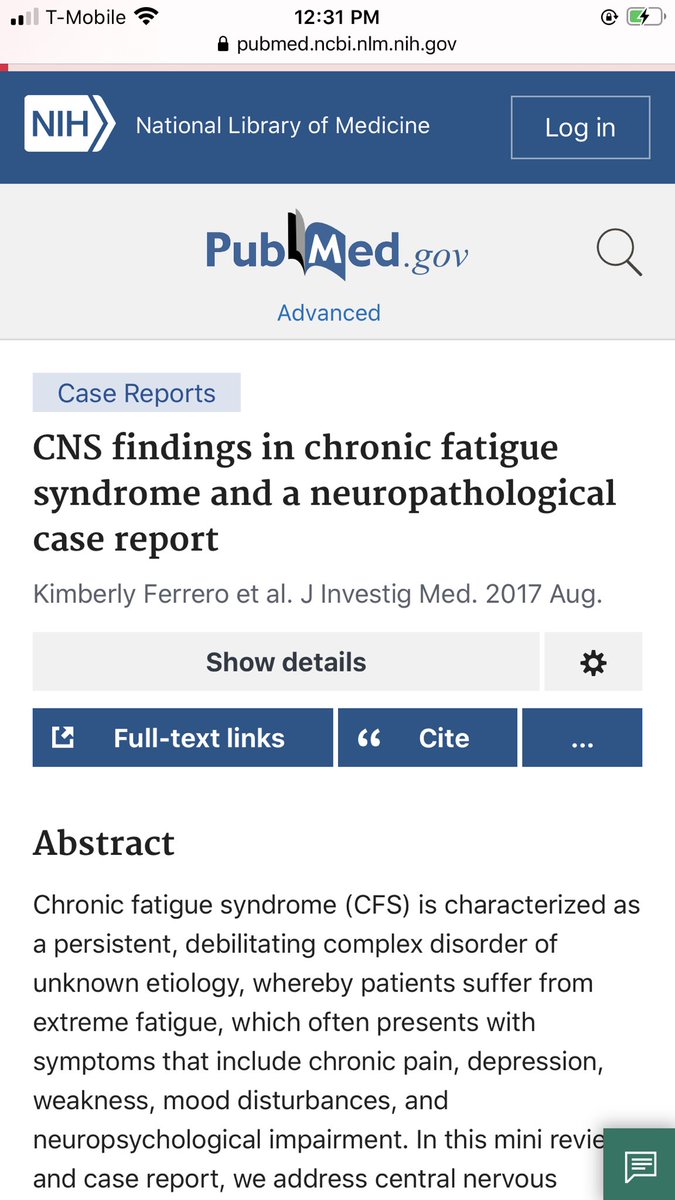
@jenbrea Hey! So I'm getting to the point where I could write a long paper about potential overlapping connections b/t #Alzheimer's and #MECFS, but I'll summarize a few top trends in this thread! First, I brainstormed often on topic with the late Rob Moir
@jenbrea 2/ Rob’s research (done w/ Rudy Tanzi + Will Eimer at Harvard) forms the core of a potential ongoing paradigm shift in Alzheimer’s - namely that #amyloid beta may be an antimicrobial peptide that forms in response to pathogens in #brain tissue: pubmed.ncbi.nlm.nih.gov/30001512/
@jenbrea 3/ To better understand that research, read this #interview I did with Rob before he passed away last year from glioblastoma. Key to ME/CFS is his work indicates that amyloid may form in response to herpesviruses like HSV1 in the Alzheimer’s brain: microbeminded.com/2017/12/18/int…
@jenbrea 4/ We know ME/CFS cases can involve herpesviruses (especially EBV and HHV6), and that herpesviruses are neurotrophic (they preferentially infect the central #nervous system). Read this interview I did w/ Dharam Ablashi who co-discovered HHV6 for more: microbeminded.com/2020/06/28/int…
@jenbrea 5/ With that in mind, this ME/CFS brain was studied via #autopsy by a team at Temple University/UCSD (it’s an excellent analysis!): pubmed.ncbi.nlm.nih.gov/28386034/ 

@jenbrea 6/ In the ME/CFS brain, the team found “Abundant amyloid deposits identical to AD plaques w/ accompanying intracellular granular structures…and neurofibrillary tangles in white matter of the frontal cortex, thalamus and basal ganglia”
@jenbrea 7/ I showed that paper to Rob Moir and there are two possibilities 1) the ME/CFS subject had Alzheimer’s and had not been correctly diagnosed. Or...
@jenbrea 8/ ....amyloid cld have formed in the ME/CFS brain for other reasons. If amyloid is an antimicrobial peptide it’s possible it formed in response to neurotrophic #pathogens in a manner that contributed to ME/CFS symptoms instead?? (more research needed!)
@jenbrea 9/ There is certainly plenty of #symptom overlap 👉 ME/CFS patients often experience profound “brain fog, which, as you can see from my slide below, often actually involves loss of short #term memory/word recall 👇 

@jenbrea 10/ It’s also worth noting that in Alzheimer’s, some studies show herpesvirus antiviral #drugs may prevent disease onset (this study showed a 90% decrease in #dementia risk in patients taking herpesvirus antivirals): pubmed.ncbi.nlm.nih.gov/29488144/
@jenbrea 11/ We know anecdotally that ME/CFS patients often also respond to the herpesvirus #antivirals, so that is another connection from a #clinical perspective...
@jenbrea 12/ Also this Stanford team recently showed that T cells in the cerebrospinal fluid of some patients with Alzheimer’s were responding to Epstein Barr virus: pubmed.ncbi.nlm.nih.gov/31915375/
@jenbrea 13/ That suggests that Epstein Barr #virus could be a player in both ME/CFS/Alzheimer’s. For all we know the virus could simply infect different brain regions/cell types in patients with the two different diagnoses
@jenbrea 14/ OK that’s enough info for now! Our #PolyBio team is working with the Alzheimer’s research teams mentioned in this thread to better study the trends I’ve mentioned in ME/CFS. We are currently #fundraising for the projects so fingers crossed we may learn more moving forward
• • •
Missing some Tweet in this thread? You can try to
force a refresh


